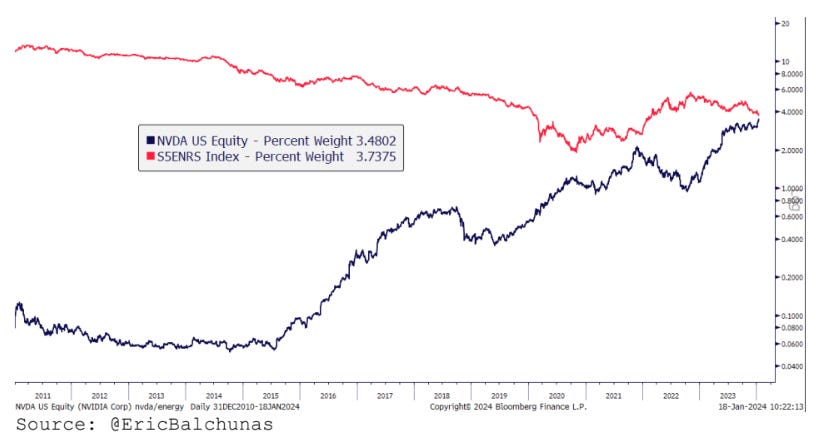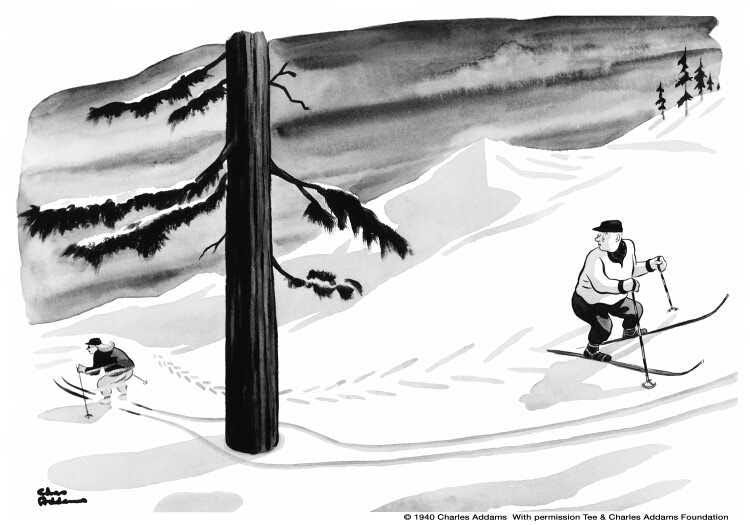
The Sunday Drive - 01/28/2024 [#95]
👋🏼 Hello friends,
Let's enjoy a leisurely Sunday Drive around the internet.
🎶 Vibin'
The last several months of stock market performance have provided strong returns with very little volatility. Who knows how long this smooth ride will last? 🤷🏼♂️ But I guess we can enjoy it while it does. So this week, I’m vibin’ to the monster 1984 classic hit, Smooth Operator by Sade. Enjoy.
💭 Quote of the Week
“Do not seek to follow in the footsteps of the wise, instead, seek what they sought.”
– Matsuo Bashō
BONUS QUOTE OF THE WEEK
”The purpose of volatility is to make people make stupid decisions.” - Jared Dillian
📈 Chart of the Week
I’ve heard a number of people claim that “Artificial Intelligence (AI) is the new oil.”
I believe there is much truth to the idea that AI will be just as transformative for our economy and society as oil and the internal combustion engine were to the industrial economy of the 19th and 20th centuries.
The Chart of the Week shows that as a percentage of the S&P 500, the market cap of NVIDIA Corp. (blue line) is almost the same market cap as the entire Energy Sector! 😳
NVDA is widely regarded as the most successful and purest representation, for now at least, of the emerging role of AI in our economy. The stock certainly does reflect that.
However, to borrow a phrase from my former Chief Investment Officer, “One thing is for sure, you’re not early.” (H/T to Duncan).
So let’s just say that perhaps the easy money has been made in the stock.
🚙 Interesting Drive-By's
This week we have articles on judgment, longevity, age discrimination, and employee loyalty:
⚖️ It’s All a Judgment Call - from Jason Fried
It's all a judgment call. Every human decision is a gut decision. The decision itself is the messy integration of many disparate pieces of information, experiences, instincts, stories, and unknowns.
Data may inform, but as long as a human is making the decision, it's ultimately a judgment call. If you're just going by the data, then you're confirming, not deciding. Machines are better at that than you'll ever be.
A decision is a point of view seen through a million lenses, many of which are invisible even to the one deciding. The lenses are formed by every experience that person has ever had, their imagination, and, in many ways, the generations of people that came before them in order for them to be here. An experience doesn't exist without a prior experience. And every past colors every future.
Think about it. When companies hire executives, they ultimately hire on experience and judgment. Hiring itself is a judgment call about other people's future judgement calls. [link]
💡 What Role Should the Government Play in Sparking the Longevity Economy? from Brian Clark
Let’s explore the role of government in shaping and accelerating the necessary changes that must occur for a harmonious transition to an older society and its accompanying economic ramifications.
On one hand, we have the “total control” approach of the People's Republic of China. And on the other, we have the laissez faire market approach of the United States, which is just now adding some teeth back into a law that was supposed to protect older people from age discrimination in the workplace all along.
While the premise of Longevity Gains is that market forces will bring about the most meaningful change in the shortest amount of time (as with the creation of youth culture), that doesn’t mean that a bit of stick combined with the carrot isn’t welcome. [link]
🤔 Why Older Workers Are Having Trouble Getting Hired - from Meghan McCarty Carino
Older Americans are becoming a bigger slice of the population as the Baby Boomers age, and they’re staying in the workforce longer than their predecessors did. People 75 and up are the fastest growing segment of the workforce, according to recent analysis from the Pew Research Center.
Keeping more people in the workforce is generally a good thing for the economy, but having four generations in the workforce together can feel crowded. Young people have long complained about their elders not making space for them to advance (just look at the political landscape).
That may still be happening. But, at this point, it’s the younger generations that are moving into management roles and doing a lot of the hiring, and not always giving older candidates a shot.
Getting turned down for a job is never fun, but the last time it happened to Amy Massingale, she said, it really stung.
“I was told that they were looking for someone with … less experience,” she said. [link]
🏢 The End of Workplace Loyalty - from Business Insider
I decided to dig deeper into the concept of loyalty. Where did this norm come from? Is it true that loyalty no longer pays? Was there a time when it did? And why does everybody get so fired up about it? At the moment, there's an overwhelming sense that work — and the underlying relationship between employers and employees — is fundamentally broken. Some people chalk it up to the discontents of the return-to-office wars. But I think the anger runs much deeper. Neither employers nor employees feel they're getting what they expect from the other.
It turns out there's a whole body of research around these questions. It focuses on what organizational psychologists call the psychological contract — the set of things that employees and employers believe they owe each other and are owed in return. Many of these beliefs are societal in scope. Others emerge from personal experiences on the job. But for the psychological contract to hold up, you need both mutuality (both parties have a shared understanding of expectations) and reciprocity (both parties believe they're getting a fair deal). Do that, and you generate the kind of trust and loyalty that leads to high productivity and low turnover. Fail to do that and — well, that's where we find ourselves right now. A world in which the psychological contract is profoundly broken. [link]
👋🏼 Parting Thought
Some people deal with winter better than others…
If you have any cool articles or ideas that might be interesting for future Sunday Drive-by's, please send them along or tweet 'em (X ‘em?) at me.
Please note that the content in The Sunday Drive is intended for informational purposes only, and is in no way intended to be financial, legal, tax, marital, or even cooking advice. Consult your own professionals as needed.
I hope you have a relaxing weekend and a great week ahead. See you next Sunday...
Your faithful financial provocateur,
-Mike


